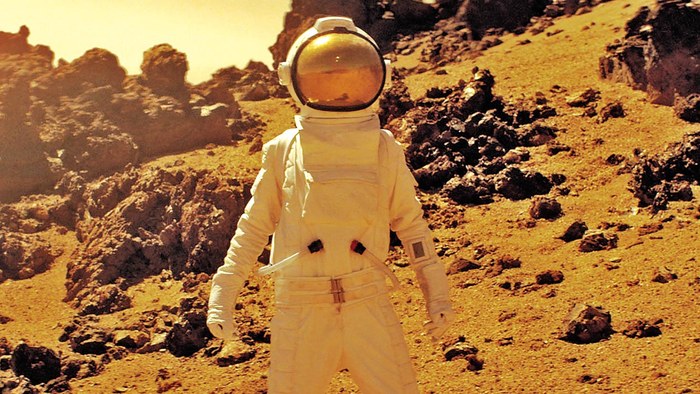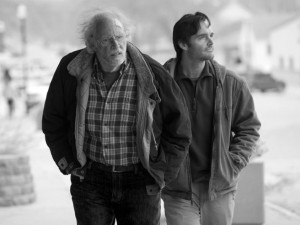

Last Thursday James Bates sat down to watch two films that explore cracks in the masculine facade. Alex Gibney’s new film The Armstrong Lie, and A Gun In Each Hand (Una pistola en cada mano), a Spanish film with a very impressive cast.
A Gun in Each Hand screens again on Oct 11 1pm at the Rio Theatre. The Armstrong Lie sees theatrical release Nov 8th, 2013.
Even in relationships, men hate to lose.
Cesc Gay’s film A Gun in Each Hand is a series of vignettes that explores a variety of themes from the point of view of the aging urban man. Gay’s film does not explore masculinity as ruthlessly as some of us would have liked. The filmmaker is quoted in the VIFF guide as saying that “the role of men in our society has changed…and I have a feeling that we, the men, have been the last ones to notice it.” This set me up for some sort of darkly funny send up of patriarchy, but the film was a more light-hearted look at men and their 21st century pathos. But in the funny moments, there were truths about men , even if these ‘truths’ do not apply to all men. For example, we don’t like to admit mistakes, and even when we do, it’s a familiar narrative: A great man has fallen. The old “I just flew too close to the sun” story. We are possessive of women and obsess over a misguided, mistaken notion of winning and losing in relationships. These dramatic shortcomings are presented as pathetic, setting up the humour nicely.
[field name=iframe2]
There are also great performances from the cast. The male actors do an incredible job with their characters’ pathos and their numerous masculine flaws. All performances are subtle, intimate, and totally humanizing. Highlights include a scene where a husband and new dad (played by Eduardo Noriega) tries to pick up a co-worker (played by Candela Pena) at an office party, only to wind up learning a lesson about sexual objectification. The choice to keep the film lighter in tone may have been made with an eye to encouraging dialogue about the changing role of men in society. After all, another male truism is that we are sensitive about our own egos and no one else’s. This effectively makes talking about men’s issues a touchy subject, especially for those men who have the most adapting to do. Yet, if Gay really wanted to write “ruthlessly” about men, he should have dug a little deeper into why we are the way we are. The film just kind of ends with a few of the male characters gathered around a table, confused, defeated, united only in their shared pathos. The female characters were intriguing and well performed, yet received little screen time. While this is an understandable decision when making a film about men, it wasn’t the only way to go. Still, I highly recommend going and seeing this film Oct. 11Th at the Rio (19+).
The Armstrong Lie
[field name=iframe]
Watching the Armstrong Lie, I was reminded of Gibney’s work in Enron: The Smartest Guys in The Room. Both films are not simply about falls from power or how some people will always try to cheat to get ahead. If there is any perceived value in a system, people will always try to game that system. But this should tell us more about systems, for example professional sports or corporate business, than it should about individuals. Yet film narratives, like most any media, focus almost entirely on individuals. The myth of the hero, or in this case, the antihero has been a central cross-cultural theme in story telling for a long time. Lance Armstrong is probably the most romantic figure in the history of professional sports. The only reason you don’t know this is because no one in North America watches cycling. The Armstrong Lie actually does a decent job of explaining the sport to the uninitiated, utilizing plenty of impressive footage from the 2009 Tour De France. Eavesdropping on audience conversations leaving the theatre, “what a compelling story” was a common quote. We follow Armstrong through his 2009 return to the tour after a brief retirement. We also see moments from the original comeback from testicular, brain, and lung cancer to win the hardest sporting event in the world.
The comeback story is one of the most compelling and cliche’d in sport. Armstrong’s comeback meant something to cancer survivors all over the world, and his story captivated a mainstream audience. This is exactly why his downfall was so dramatic. Watching him, in scene after scene, aggressively deny what we now know to be true, that he cheated, was hard to watch. Hearing of how he bullied people close to him to maintain his story disgusted me. However, there is more to this story than what casual Oprah viewers may know. In this part of the world, sport usually means a variation on hand-eye coordination skills, usually chasing around some sort of object in an enclosed space. Cycling is not sport in this context. Stage races are typically thousands of kilometres in length. The history of cycling is riddled with rider deaths and substance abuse. One hundred years ago, riders used alcohol and ether to numb the pain. There is also the moral relativism involved in using blood transfusions (of your own blood) to boost performance. During the period that Lance won his tours, you were an anomaly if you did not dope.
Which brings me back to gaming the system. Armstrong broke the rules, yes, but he didn’t do anything that most of the other competitors were not already doing. But that’s not why people are pissed. And that is not what makes Armstrong the incredibly flawed figure that he is.
Lance Armstrong went to great lengths to cover up his doping long after most of his former competitors were busted. Armstrong used his considerable power as a wealthy media personality to obscure the truth. In fact, if Armstrong’s team for all of his tour wins was not a federal organization (the US Postal Service), the FDA may never have taken an interest in his story. If Lance had never tried to come back to the sport in 2009, he may never have been found out. Many of the other riders who were caught, simply admitted to it, apologized, promised reform, and are now competing clean. One of the central responsibilities of the documentary filmmaker or journalist is to speak truth to power. Gibney’s role is difficult here. Armstrong still maintains he rode the 2009 tour clean. A ‘fact’ Gibney himself doubts. The film still does a great job of interrogating Armstrong’s story and there is much room left for the audience to decide on Armstrong’s character. Gibney perfectly captures this antihero in a portrait that is equal parts humanizing and damning. Armstrong’s story is complex, he appears in this film as a man who is not self-aware, who’s ego became a blind spot. His ultimate legacy will be that of a fraud. And yet, given the context of his cheating, all he had to do was admit to his cheating and do the right thing. Problem is, he did it about 5 years too late and only after a federal investigation proved he was lying.




